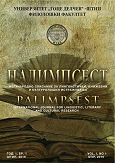THE RECEPTION OF CAMUS IN MACEDONIA
DOI:
https://doi.org/10.46763/PALIM24917113sAbstract
Albert Camus and Jean-Paul Sartre, as two main representatives of French existentialism, two “frenemies” have exerted a strong influence on the cultural, literary, ideological, and political life of Macedonia. They remain relevant to the reflection and sensitivity of today’s Macedonian public. The reception of their literary and philosophical works varied depending on the cultural, literary, ideological, and political circumstances faced by the Macedonian public. They received a warm welcome immediately after World War II and especially during the 1960s. Initially, this reception was primarily based on ideological preferences, with Sartre being considered a supporter of the more liberal Yugoslav communist model. Sartre somewhat overshadowed Camus. After the publication of “The Rebel” a definitive rupture between Sartre and Camus occurred, mainly due to their political orientations. After only a few years, Camus received the Nobel Prize, a highly appreciated award at the time by the public. For a while, Camus overshadowed Sartre, and his works began to be translated into Macedonian and Albanian. A bit later, in 1964, Sartre declined the Nobel Prize, and this act elevated his fame to its peak, perhaps until his death. The fall of the Berlin Wall and the change in ideological and political values also led to a change in cultural and literary values. This brought about an updating of the works of these two authors. Today, in the Macedonian cultural space, in search of exclusively literary and aesthetic values, faithful translations of the works of these two authors are being born, as well as in-depth studies about them, in Macedonian and Albanian languages, which foster a new reading of their works based on the art that arises from their literary creativity and no longer from extraliterary preferences.
Keywords: Camu; French; existentialism; literary reception; literature; politics; Macedonia.


